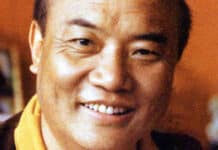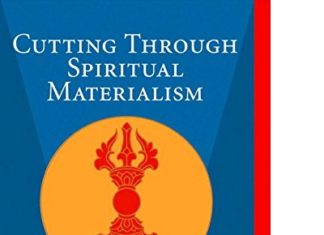
I‘d been eagerly awaiting a chance to see Crazy Wisdom after it premiered in Santa Barbara in February, so when I heard it was playing at the Buddhist Film Festival in Amsterdam, where I live, I immediately got tickets for my husband and myself, aware that it might be the only time we could see it on a big screen. I was delighted with the beginning and middle of the film, which I felt honored Chögyam Trungpa Rinpoche. I felt gratitude to Johanna Demetrakas for making this tribute to the Vidyadhara that moved me to tears at some points.
However, I was disappointed with the way the film winds down. Putting interview statements about Rinpoche’s “unconventional” behavior, his drinking and relationships with his female students, at the end of the film concluded it on an ambiguous, if not sour, note. The overwhelmingly Dutch audience, which had felt open and curious before the film, seemed to palpably deflate and withdraw its interest in Trungpa Rinpoche at the end. Unlike the long, enthusiastic applause for Bodhisattva, Mark Elliott’s film about the 17th Karmapa that played the next day, there was no applause at the end of Crazy Wisdom. Whereas people hung around to talk with Mark’s son after Bodhisattva, the audience practically stampeded out of the theater after Crazy Wisdom.
I am aware that Ms. Demetrakis had many things to consider in the making of this film. She apparently wanted to avoid the charge of “hagiography” from critics, which is understandable. After all, her professional reputation was at stake.
However, my concern is whether this film really did justice to the Vidyadhara’s work, and I have doubts about that. If conventional American audiences respond to it the way this Dutch audience did, Crazy Wisdom is unlikely to attract people to the Vidyadhara’s teachings. If that is the case, what is the value of the film? Why would I want to recommend this film to a potential student of Rinpoche’s teachings?
I talked about it with Jan-Paul, my husband, after we got home, and we both realized that Ms. Demetrakas could have ended the film on an inspiring note. It needn’t have ended with discussion of his extra-marital affairs and with Lady Diana Mukpo saying she didn’t know what made him tick after being married to him for 17 years. This conclusion leaves the audience wondering whether Trungpa Rinpoche had lost his way after coming to America with such a compelling vision for planting the dharma in the West, as described at the beginning of the film. If his wife didn’t know what made him tick, a conventional person might think, who would?
However, students of the Vidyadhara aren’t conventional people, so I suspect that plenty of those students have something to say about what made him tick. Jan-Paul’s answer to the question was, “Waking people up!”
My answer is that Rinpoche’s students made him tick. He as much as told us so at my seminary:
I am very deeply moved and very encouraged; and being at this seminary, people have said, “You’ve lost weight. You look healthier.” But I hadn’t lost weight, and I didn’t look particularly healthy. But I feel delighted with the whole thing and with working with you people. Every one of you has added a lot of beauty, power and strength to my work and also to the work we are doing together in creating the future of vajrayana in the American kingdom. I should say to be accurate. Every one of you has been very good and very patient and has put a lot of exertion into your discipline—which is fantastic. I feel utterly overwhelmed and highly encouraged at this point.” ~ Chögyam Trungpa farewell address at 1976 Vajradhatu Seminary, Land O’ Lakes Wisconsin
What turned Rinpoche on was to see his students ‘get it,’ and to watch us evolve through our practice of the dharma. That’s what he lived for, I’m certain: to watch the dharma manifest in our beings, and to see our creative potential unfold along with the development of our practice. What made him tick was to see us becoming ‘dharmic people’ – Shambhalians – capable of creating a sane society.
That’s my answer to ‘what made him tick,’ but I’m sure other devoted students of the Vidyadhara can come up with more eloquent and interesting answers that would reveal the effect that his skillful means and crazy wisdom have had in their lives. I’d like to see people speak those answers to the camera as confirmation from his students that Rinpoche did not lose his vision and become just a womanizing drunk. I doubt that Johanna meant to leave people with that impression, but if anyone wanted to see him that way, the film as it is does not discourage such an impression.
This is my fantasy for how to conclude Crazy Wisdom: after Lady Diana says she doesn’t know what made him tick, there would be a brief section – 10 or 12 minutes – in which lots of his students would say in quick sound bites what they think made Rinpoche tick. Lady Diana could also have the opportunity to add something to her previous statement. Perhaps she would say something like, ‘Yes, well, they’re right. He did live for his students. They were his family, too.’
This section would raise the lungta of the film and return its focus to the Vidyadhara’s mission of bringing the dharma to the West. It would show that, in the experience of Rinpoche’s heart students, his crazy wisdom was not destructive, it was creative. His crazy wisdom woke us up, expanded our minds, and, in some cases, left us with a mission and meaningful work for the rest of our lives. I’d be a lot happier with Crazy Wisdom if that were clearer by the end of the film. Then the beautiful shots of the cremation ceremony at the end, with all those people and rainbows, would make more sense. Charges of hagiography be damned, it seems to me that the film could at least leave a coherent impression of its subject.
Comments
Dear Ms. Demetrakis,
Thank you so much for all your efforts and heart connection to Trungpa Rinpoche, which show so clearly in your production of the film, Crazy Wisdom. How can one explain a force of nature manifest in human form? You have done well in my humble opinion. And at the end of the film when Lady Diana Mukpo said she didn’t know what made him tick, I cried for several days. Who of us there knew the answer to that riddle? And even now, while he is living in our heart centers, do we know the answer
Many years ago Mipham Halpern Rinpoche told me a story of how Milarepa used himself as a stool for Marpa’s wife while she was milking cows. I remembered how Lady Diana was the first student of Trungpa Rinpoche to commit to loving him. How amazing. How glorious. And, how stupid! Throwing one’s life in the path of the guru.
I thought it very funny that the Dutch audience ran out of the theatre; it showed a lot of sanity by them on some level. So many of us would have run away, but were dragged back by our love of whatever that manifestation called Chögyam was. There are many of us students, lovers, and admirers of our beloved Lord Mukpo. How marvelous we all share this in common. How marvelous that many of us are flowering in the light of His sun.
So thank you again for your personal creative display of the life of our Beloved.
Cheers, and much love to you.
John Perks
P.S. Can’t wait for the sequel, Son of Crazy Wisdom!
30 Oct 2011
Thank you for this review, Suzanne. Yes, I felt the same.
I was so moved by some parts of the film, particularly the paranirvana footage, yet like you I wondered – what was the motive for portraying the Vidyadhara’s life in this way, apart from trying to convey an apologia for ourselves? The Vidyadhara didn’t need one. His sanity was perhaps more self evident than any teacher of our time and to me the film didn’t communicate that. It portrayed Lady Diana as the mature, reflective arbiter of the facts, Trungpa Rinpoche as the indulgent delinquent, and the contents of the film – justifying its unexplained title – as a chronicle of wisdom gone askew.
And while of course I have to agree with some respondents here that karma takes us where we are due to go, and that everything invariably comes out in the wash (sometime, someplace), the film left me with a feeling of sadness, as though a great monument had been defaced and then presented as complete. It was not even what was included that disappointed me, but what was left out.
–Susie Vincent, 26 Oct 2011
Dear friends,
I am sorry to hear that Suzanne Duarte felt the film ended on a disappointing note, and evidently the Dutch audience felt the same, withholding its applause. All Trungpa’s students felt real disappointment when Rinpoche died, and his death was a process of gradual withdrawal that lasted years. It broke our hearts to see the teacher we loved go away, which is also a lesson in the way things are. As far as “what made him tick,” I agree that seeing his students develop was what moved him and sustained his life force; the converse is also true, that many of us turned away from the white-hot torch of his uncompromising presence. Even being a student of the greatest master becomes mundane; “Should I go see him today? I’m tired from work and we have the party tomorrow night.”
Don’t worry that the film will turn people off; Trungpa himself was the reigning master of turning people off. He couldn’t care less and I do not think we should either. I commend Johanna Demetrakis for the way she made the film, because she is not sucking up to anyone. In my viewing of the film, there are plenty of older students saying what they experienced as Trungpa’s bewildering and confusing manifestation, just as Ms. Duarte suggests they should, but without the “it’s okay in the end because he was a great guy who loved his students” message. A hagiography is a reinforcement of faith for the faithful, and one should avoid that for obvious reasons.
In closing, the oldest fallacy, going back to Plato, is to compare the good with the ideal. This fallacy drives our confusion, or as Trungpa said: “the lubrication of Samsara is the belief in an alternative.” “What is” is good enough simply because that is all there is. Vision is not imagination; seeing our shortcomings is not self-denigration. We are all in this together, and Trungpa very graciously joined us here for a few precious years. How he conducted himself is a koan, a riddle, a direct challenge to our confused demand for perfection. None of us can figure this one out, and a sugar coating probably won’t help us take the medicine.
Yours in the sangha,
–Paul T. Wegener, 26 Oct 2011
It’s very interesting to be here in China, where the question of “where are you at?’ never seems to be relevant and people dwell in that peculiar way that Daoism has infected Chinese culture, with it’s teaching of “wu wei,” or not-doing. When this is a cultural norm –what we might otherwise call inscrutability– the downstream side is that conversation tends to be more what Betty Bao Lord in “Chinese Mosaic” referred to as “fishing” in contrast to her description of American conversation, as “tennis.”
Saying that we didn’t know where Rinpoche was “at” begs the question of how relevant that consideration is. From this side of the lake I’d have to say that it’s almost totally culturally driven, just like “the terrible twos” so solidified as normal children’s behavior, which likewise doesn’t seem to exist here. So I’d say that in this film and also as a meaningful criterion as to what kind of person the Vidyadhara was, the questioning of who he “really” was says more about the person who asks than it does about the Vidyadhara.
In China, as well as Tibet and Japan, people seem quite happy to live with a sense of other as vague, obscure. It doesn’t seem to arouse that much conjecture or opinionation in our attempt to pin things down, but that seems just fine in this part of Jambudvipa. And as long as I’m dwelling in conjecture, it might account for the role of wonder as a cultural norm as well.
I think it’s one thing to feel that way looking at the Great Wall, a football field sized self-arising Vajrayogini, or the rock that bears the 4th Trungpa’s footprint. Where the rubber meets the road is very different in how things mean, particularly in communication, such as speech or in writing. Take calligraphy for example. We have written words, Chinese have written words. However how these words mean, written left to right, right to left, or top to bottom, is something that invites conjecture and participation on the part of the reader, rather than an explicit relationship between symbol and meaning. So it’s more open to us and actually takes more work on our part to engage it, decipher it.
Same, I submit, with the Boss. He wanted to engage communication as a tool, maybe *the* tool of openness. How could we nail him down to being this or that when that tool was his primary means of communication So we should be broadminded with this kind of stumble in the film. But at least it inspired a good conversation, didn’t it
–Lee Weingrad, 26 Oct 2011
Thanks you for your intelligent remarks about this film. I was discouraged as the movie progressed from the bright light of CTR early in the film to the somewhat ordinary apologia as it moved along to its confusing end. Perhaps the filmmaker was touched by the Vidyadhara early in his teaching life as witnessed by the people interviewed. He, on the other hand, is apparently without beginning or end which is difficult to put onto film. Mary Smith’s remark stands.
–Marcia Usow, 24 Oct 2011
Per Suzanne Duarte’s review of “Crazy Wisdom”…
History will eventually view the Vidyadhara alongside Tilopa, Saraha, Padmasambhava, and the other great siddhas. In the meantime, let’s carry on, inspired by our teacher. VCTR, as Padmasambhava, was a secret teacher. Those of us who were fortunate enough to receive teachings from him were, well, very fortunate. The Vajrayana is self-secret. So, don’t worry. It’s always been so. The rest will gravitate to more conventional teachers. No promises, no blame!
Cheers,
Christopher Huck, 24 Oct 2011
Thanks Suzanne. I too was disappointed with the film. Where was the great project of giving birth to and disseminating the Shambhala teachings And I was hoping for an interview with any one of the many current Tibetan teachers, their own behavior beyond reproach, who talk about the Vidyadhara as a great realized being, beyond conventional measure. As a kusung (personal attendant) to the Vidyadhara for many years, I saw close up many instances of his relationships, not just with women but with people in general–in my experience always extremely personal, loving, humorous and available. So simply there without artifice that it was often terrifying. Few of us have had the good fortune of meeting such a person. May all who carry his imprint work tirelessly to offer it to others.
–Michael Chender, 24 Oct 2011
The Vidyadhara’s life was beyond concept. His teachings survive and that is the point. Many new meditators get this from the “Crazy Wisdom” film and other films of VCTR teaching. His brilliance, bravery, his playfulness, and enjoyment of life does not need to be white-washed. He needs no confirmation or affirmation. His teachings like his life speak to those who practice meditation. Without the mind of meditation it would be difficult to understand non-duality, non-concept, and “Crazy Wisdom”.
–Linda Lewis, 24 Oct 2011
Yes, he ticked for the students, he ticked for the dharma. The reason why someone might say “I don’t know what made him tick”, seems to me, is that he was utterly unconcerned what happened to himself. No one is usually like that. He didn’t tick for himself, which you’d think someone like his wife would get after a while, but perhaps she was too close to see it.
–John Tischer, 23 Oct 2011
Dear Suzanne Duarte, I have been looking forward to watching this movie as the closest thing to meeting the man and teacher whose books have helped open my mind and clear my understanding. You have saved me from the disappointment and uncertainty that the ambiguous ending of the film would have left me. I have never quite known what to think of his womanizing, drinking ways, but have thought that the deed is in the outcome, the proof in the pudding – did it cure or harm I had expected that the devoted students who were part of the film would provide that evidence, otherwise who would
In your review, you intelligently identified this serious flaw of the movie and very constructively suggested what I myself would find helpful and like to see – not because I want to support any needed perspective, but because I would like to see the truth of outcomes. Did Trungpa help those closest to him and those who were personal students or not And presentation and timing do inform conclusions… if Trungpa was a good teacher then it would behoove his students to help connect new audiences to the possibility of his teachings. We all know the world can use all the good help it can get. I hope the director and producers use your good suggestion.
And I thank you for providing your personal anecdote and understanding of what made Trungpa tick, it is this kind of personal testimony that informs my conclusion about him even as I do not doubt his value as a teacher that I myself have benifitted from.
–Maria Heng, 23 Oct 2011
Thanks to Suzanne Duarte for her review of the movie Crazy Wisdom, which points up a basic flaw in the movie and in the way we often think about the Vidyadhara and about our community today. There is often a contradiction between Crazy Wisdom and conventionality that cannot be reconciled within a conventional point of view. Chögyam Trungpa’s relations with all people, not just the women with whom he had sex, were not conventional. If we attempt to evaluate his actions through the lens of conventionality it will always be distorted and leave us disconcerted in a confusing rather than helpful way. The accurate way to present his unconventional relationships with women as well as his drinking and other ways of not conforming is by showing their essential loving kindness apart from conventionality. This allows the wisdom in his actions to shine through. Kindness is very personal and hard to both grasp and convey in a medium like a movie which may be one reason many people have trouble accepting parts of the Vidyadhara’s life as well as dealing with those parts in biography.
–Jeff LeRoux, 23 Oct 2011
Visit Suzanne at Dharmagaians.org

















